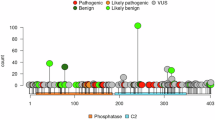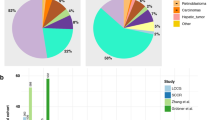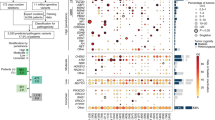Abstract
Cowden syndrome (CS) is an inherited autosomal dominant disorder associated with germline pathogenic variants of the PTEN tumor suppressor gene. Its phenotypical expression is highly variable and the existence of patients with a CS suggestive phenotype without pathogenic PTEN variant may be related to genetic heterogeneity. In order to explore this hypothesis through the detection of potentially deleterious variants enabling us to identify a new candidate gene, we performed whole-exome sequencing (WES) in a series of 22 CS patients without detectable PTEN pathogenic variant using conventional methods for mutation screening. We failed to identify a novel candidate gene, but interestingly in two patients WES revealed the presence of two distinct, previously undescribed Alu insertions with the same break points in exon 5. These insertions were not found in a series of 35 breast carcinomas that showed a loss of PTEN expression without a detectable alteration of this gene. This study reveals the presence of a PTEN Alu insertion hotspot involved in CS, and suggests that undetected PTEN pathogenic variants could contribute to CS.
Similar content being viewed by others
Log in or create a free account to read this content
Gain free access to this article, as well as selected content from this journal and more on nature.com
or
References
Liaw D, Marsh D, Li J : Germline mutations of the PTEN gene in Cowden disease, an inherited breast and thyroid cancer syndrome. Nat Genet 1997; 16: 64–67.
Bubien V, Bonnet F, Brouste V et al: High cumulative risks of cancer in patients with PTEN hamartoma tumour syndrome. J Med Genet 2013; 50: 255–263.
Mester J, Eng C : Cowden syndrome: recognizing and managing a not-so-rare hereditary cancer syndrome: Cowden syndrome. J Surg Oncol 2015; 111: 125–130.
Pilarski R, Eng C : Will the real Cowden syndrome please stand up (again)? Expanding mutational and clinical spectra of the PTEN hamartoma tumour syndrome. J Med Genet 2004; 41: 323–326.
Tan M-H, Mester J, Peterson C et al: A clinical scoring system for selection of patients for PTEN mutation testing is proposed on the basis of a prospective study of 3042 probands. Am J Hum Genet 2011; 88: 42–56.
Pilarski R, Stephens JA, Noss R, Fisher JL, Prior TW : Predicting PTEN mutations: an evaluation of Cowden syndrome and Bannayan-Riley-Ruvalcaba syndrome clinical features. J Med Genet 2011; 48: 505–512.
Houdayer C, Moncoutier V : Enhanced mismatch mutation analysis: simultaneous detection of point mutations and large scale rearrangements by capillary electrophoresis, application to BRCA1 and BRCA2. Methods Mol Biol 2010; 653: 147–180.
Casilli F, Di Rocco ZC, Gad S et al: Rapid detection of novel BRCA1 rearrangements in high-risk breast-ovarian cancer families using multiplex PCR of short fluorescent fragments. Hum Mutat 2002; 20: 218–226.
Jones N, Bonnet F, Sfar S et al: Comprehensive analysis of PTEN status in breast carcinomas: PTEN status in breast cancer. Int J Cancer 2013; 133: 323–334.
Jurka J : Repbase update: a database and an electronic journal of repetitive elements. Trends Genet 2000; 16: 418–420.
Chen J-M, Férec C, Cooper DN : Mechanism of Alu integration into the human genome. Genomic Med 2007; 1: 9–17.
Helman E, Lawrence MS, Stewart C, Sougnez C, Getz G, Meyerson M : Somatic retrotransposition in human cancer revealed by whole-genome and exome sequencing. Genome Res 2014; 24: 1053–1063.
Samuels DC, Han L, Li J et al: Finding the lost treasures in exome sequencing data. Trends Genet 2013; 29: 593–599.
Peixoto A, Santos C, Pinheiro M et al: International distribution and age estimation of the Portuguese BRCA2 c.156_157insAlu founder mutation. Breast Cancer Res Treat 2010; 127: 671–679.
Wimmer K, Callens T, Wernstedt A, Messiaen L : The NF1 gene contains hotspots for L1 endonuclease-dependent de novo insertion. PLoS Genet 2011; 7: e1002371.
Wang H, Karikomi M, Naidu S et al: Allele-specific tumor spectrum in Pten knockin mice. Proc Natl Acad Sci USA 2010; 107: 5142–5147.
Ni Y, Zbuk KM, Sadler T et al: Germline mutations and variants in the succinate dehydrogenase genes in Cowden and Cowden-like syndromes. Am J Hum Genet 2016; 83: 261–268.
Orloff MS, He X, Peterson C et al: Germline PIK3CA and AKT1 mutations in Cowden and Cowden-like syndromes. Am J Hum Genet 2016; 92: 76–80.
Yehia L, Niazi F, Ni Y et al: Germline heterozygous variants in SEC23B are associated with Cowden syndrome and enriched in apparently sporadic thyroid cancer. Am J Hum Genet 2016; 97: 661–676.
Bayley J-P : Succinate dehydrogenase gene variants and their role in Cowden syndrome. Am J Hum Genet 2016; 88: 674–675.
Acknowledgements
We are grateful to the patients and their families. This work has been supported by the ‘Fondation ARC pour la recherche sur le cancer’ (LC) and ‘le Lions club de Bergerac’. We would like to thank Dr Ravi Nookala of Institut Bergonié for the medical writer service and Bernadette Gastaldello for technical assistance.
Author information
Authors and Affiliations
Corresponding author
Ethics declarations
Competing interests
The authors declare no conflict of interest.
Additional information
Supplementary Information accompanies this paper on European Journal of Human Genetics website
Supplementary information
Rights and permissions
About this article
Cite this article
Crivelli, L., Bubien, V., Jones, N. et al. Insertion of Alu elements at a PTEN hotspot in Cowden syndrome. Eur J Hum Genet 25, 1087–1091 (2017). https://doi.org/10.1038/ejhg.2017.81
Received:
Revised:
Accepted:
Published:
Issue date:
DOI: https://doi.org/10.1038/ejhg.2017.81
This article is cited by
-
Identification of a germline deep intronic PTEN-deletion leading to exonization through whole genome and targeted RNA sequencing
Familial Cancer (2025)
-
Considerations on diagnosis and surveillance measures of PTEN hamartoma tumor syndrome: clinical and genetic study in a series of Spanish patients
Orphanet Journal of Rare Diseases (2022)
-
A Variety of Alu-Mediated Copy Number Variations Can Underlie IL-12Rβ1 Deficiency
Journal of Clinical Immunology (2018)



